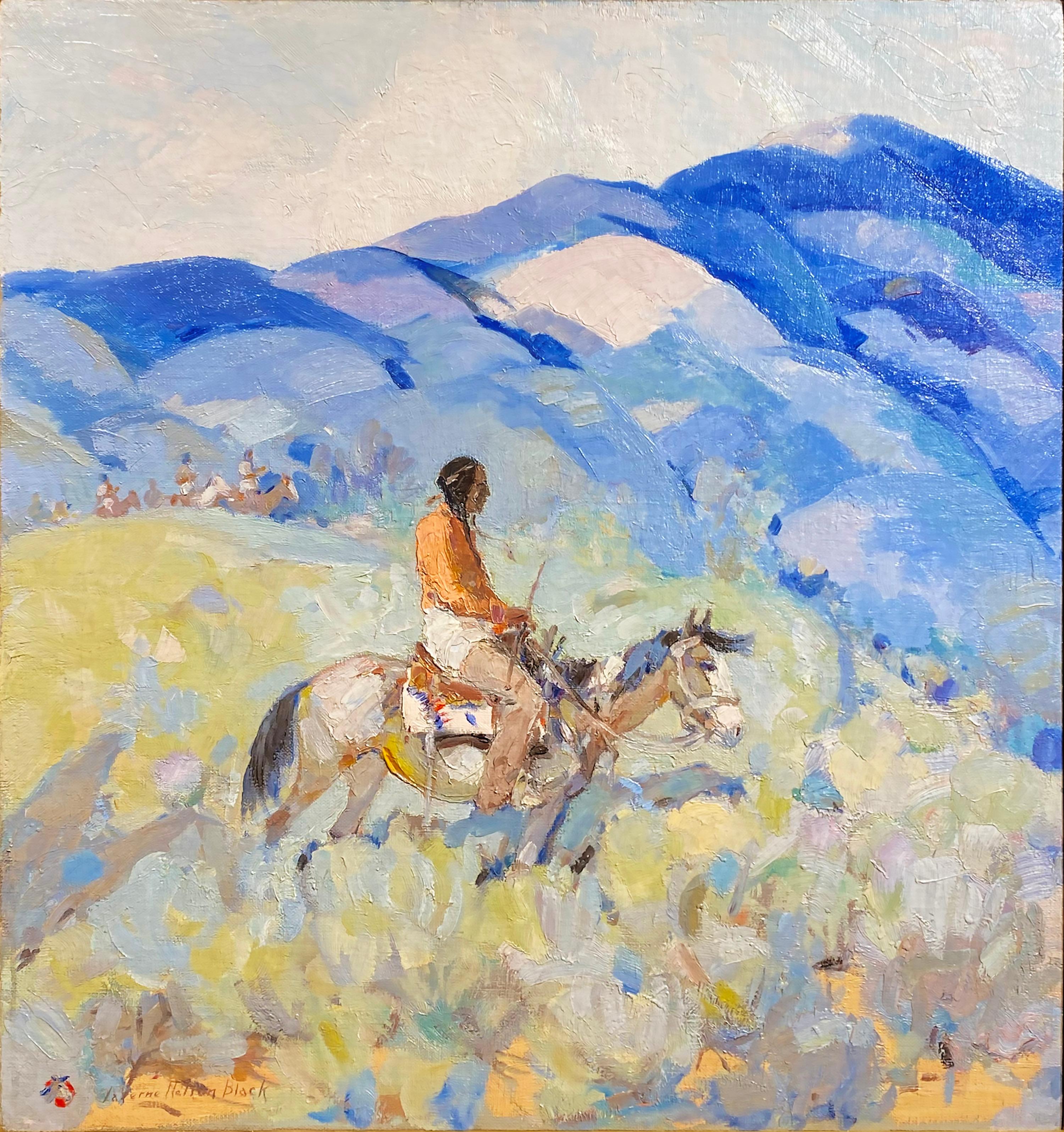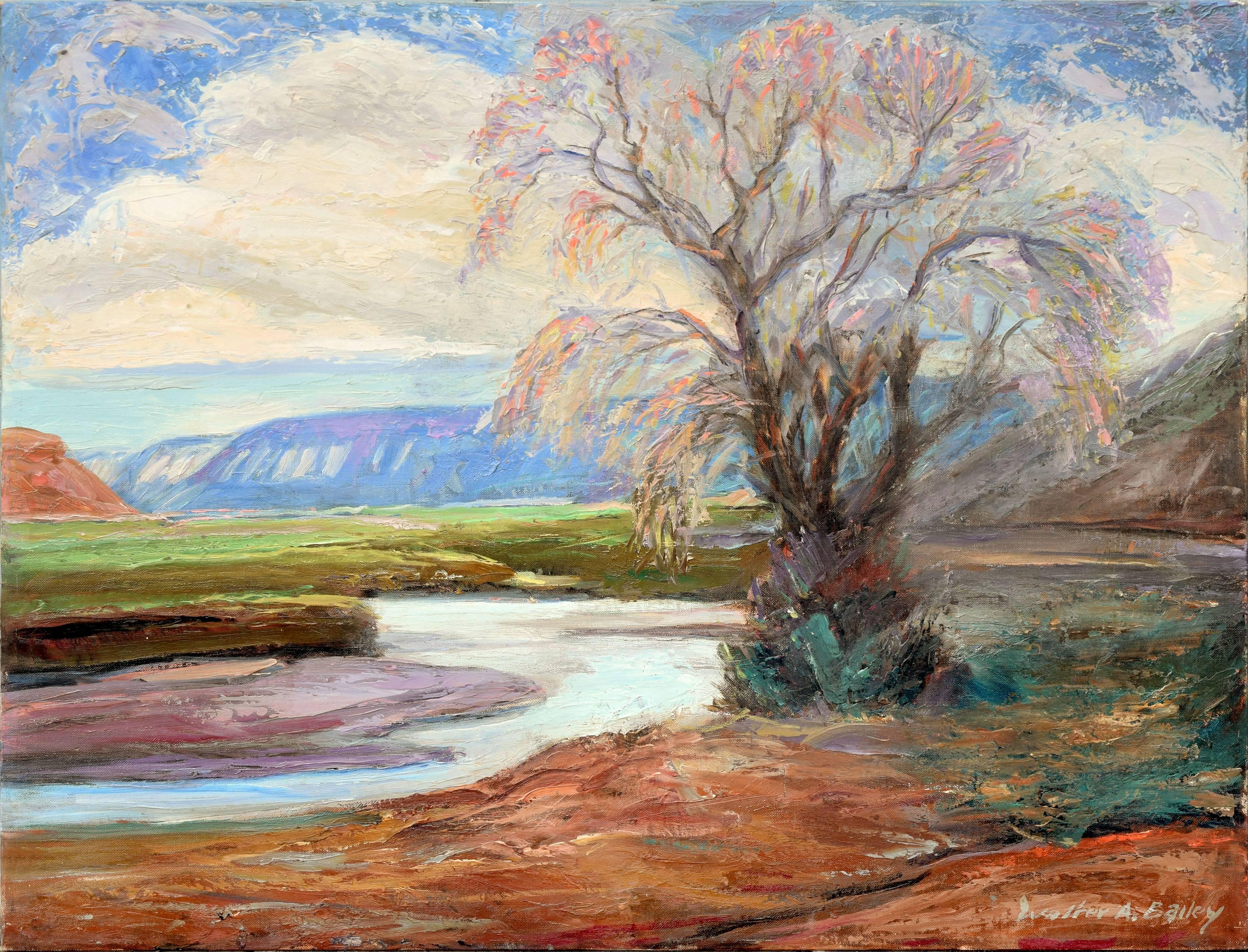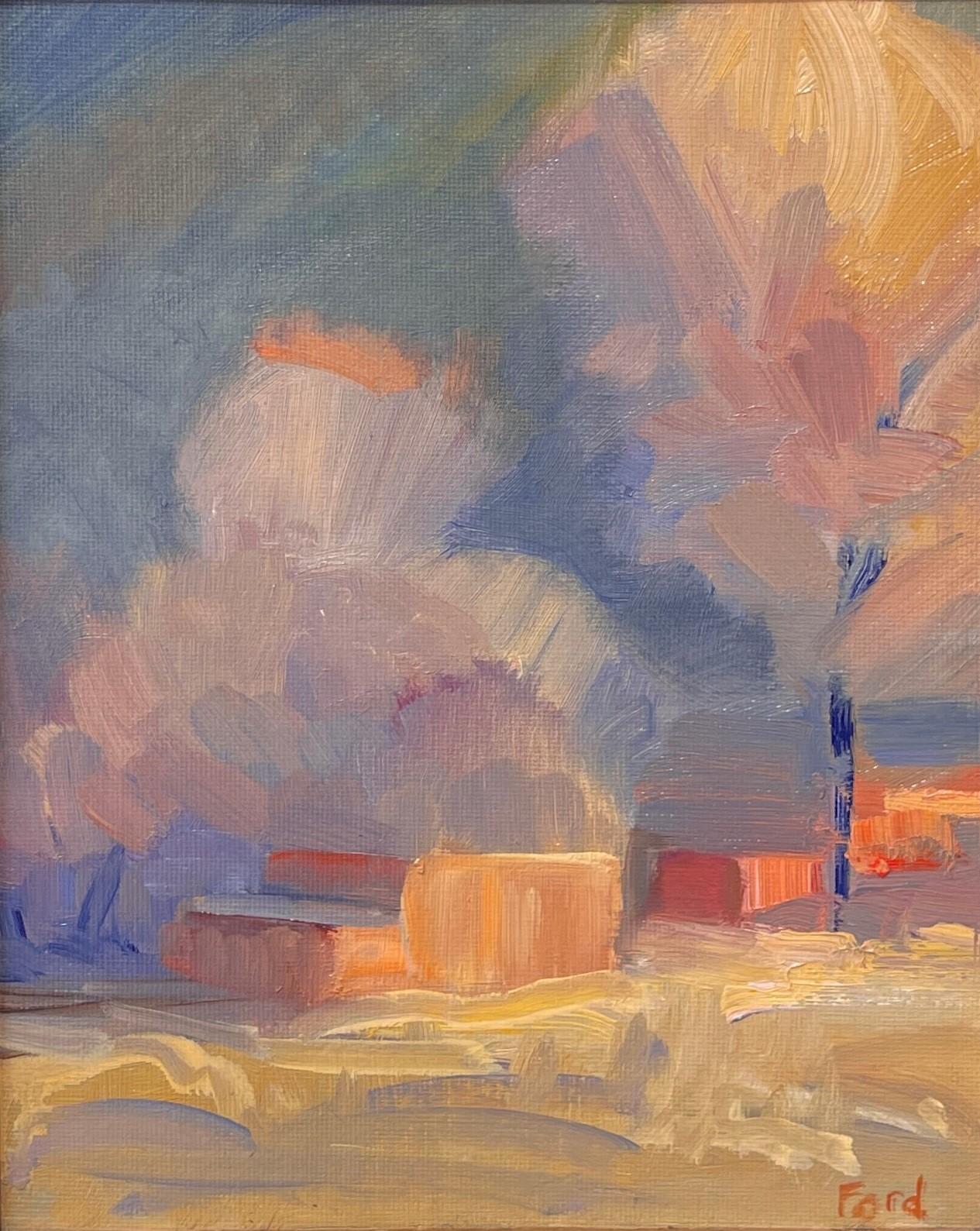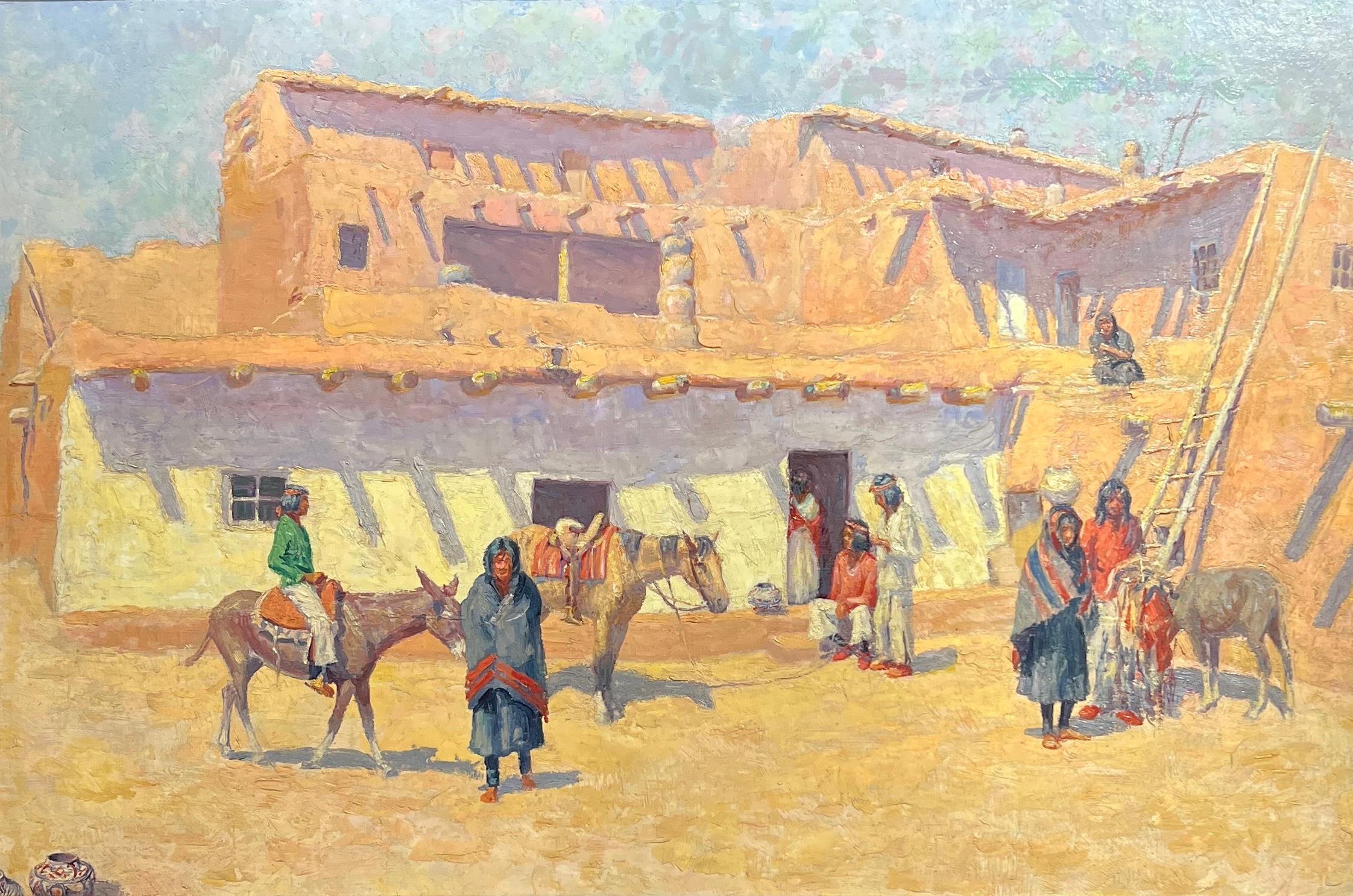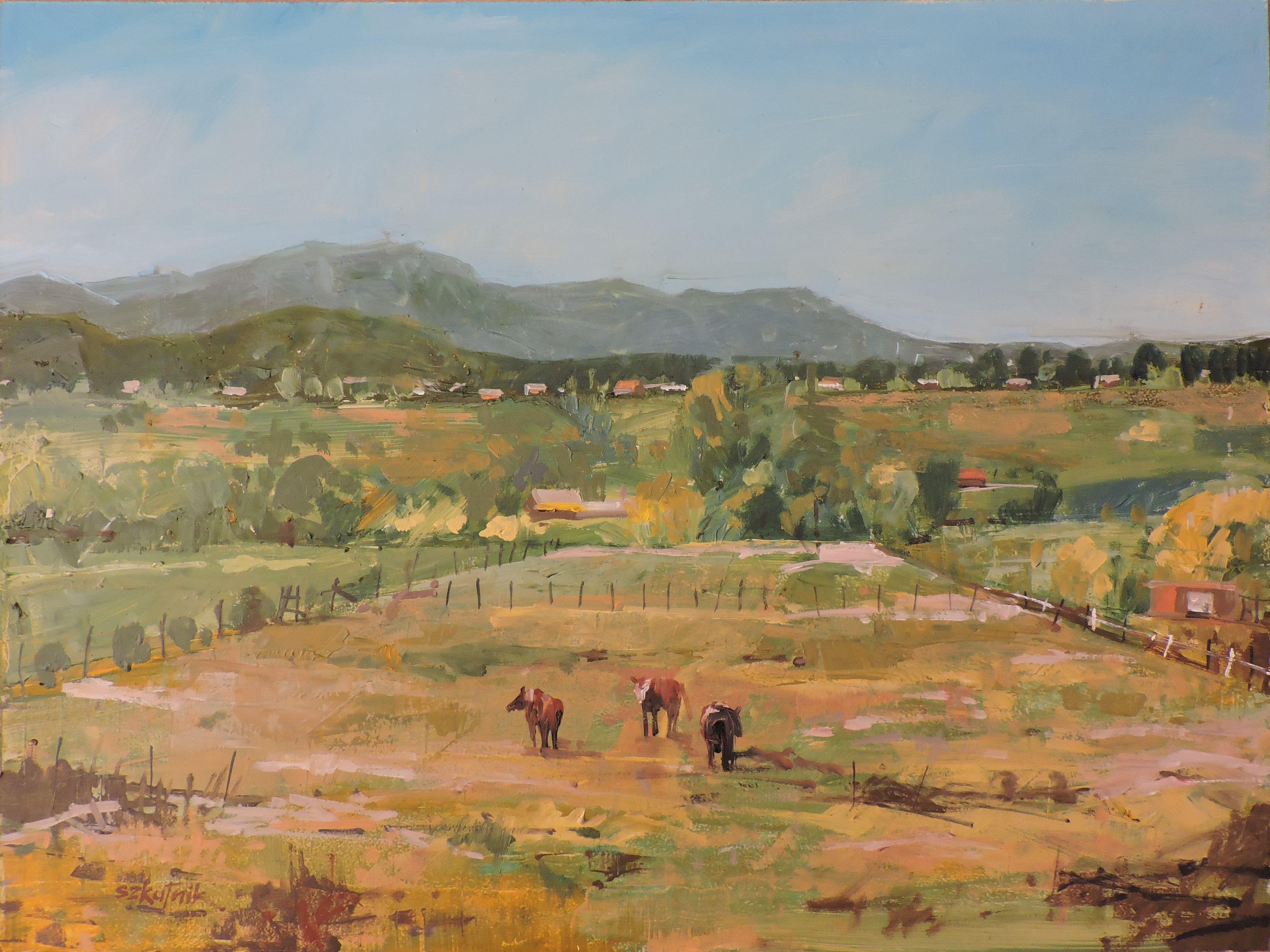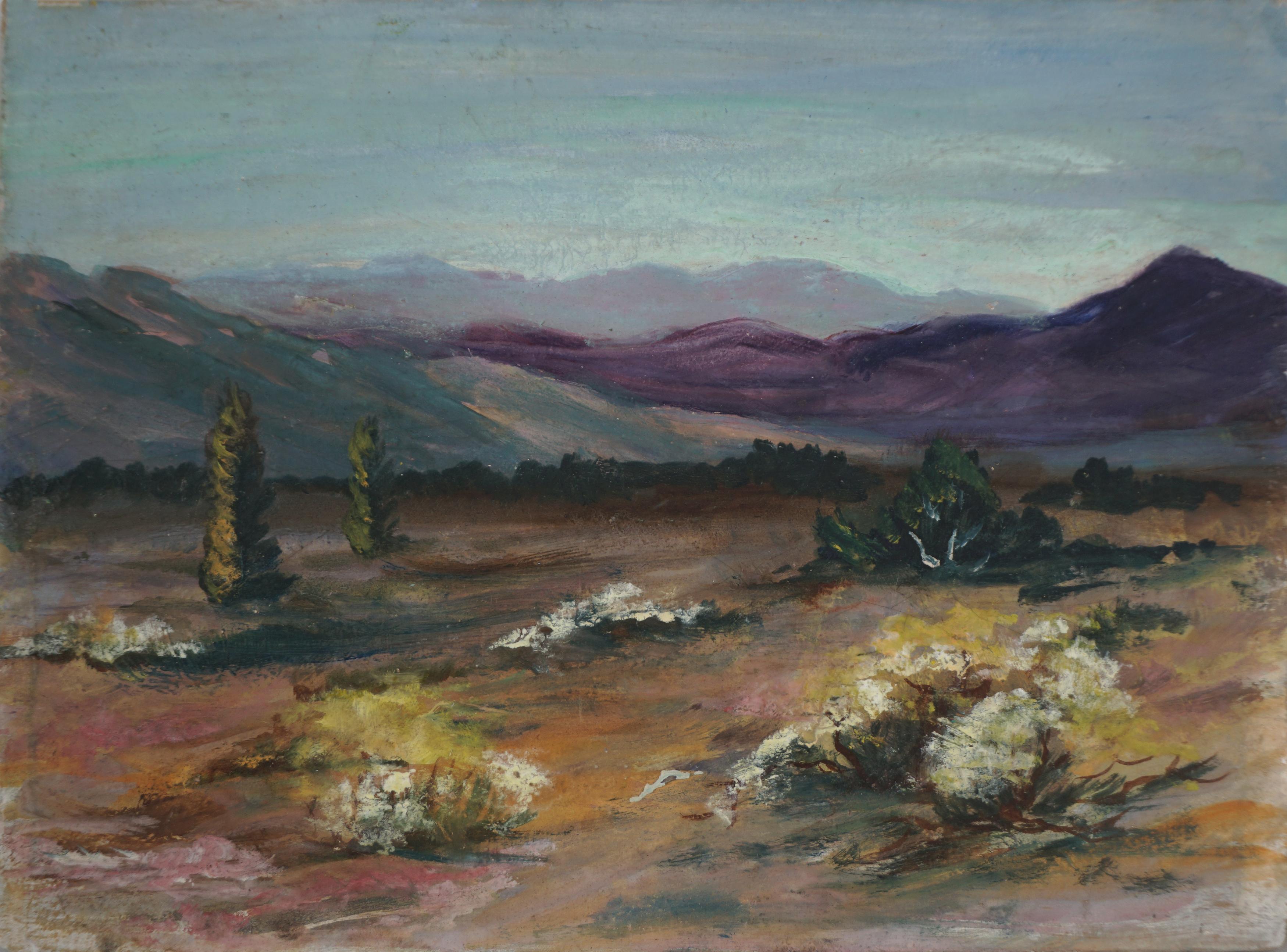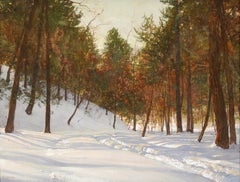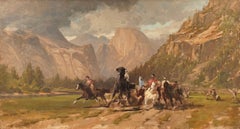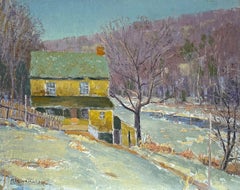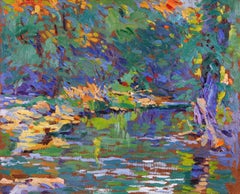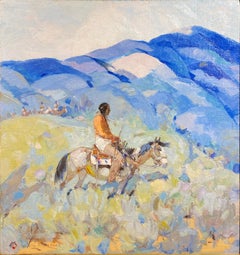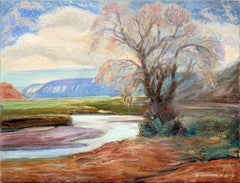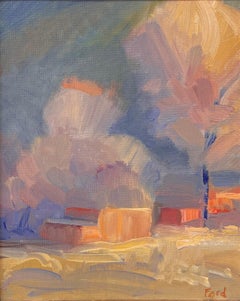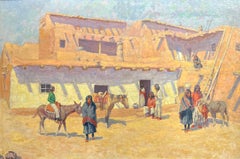Items Similar to Taos
Want more images or videos?
Request additional images or videos from the seller
1 of 4
Laverne Nelson BlackTaos
$48,500
£36,483.63
€42,264.60
CA$68,374.96
A$76,037.52
CHF 39,902.16
MX$927,240.95
NOK 504,377.32
SEK 472,873.84
DKK 315,457.82
About the Item
Taos
Oil on canvas laid to aluminum, 8 1/8 x 10 1/8 inches (20.6 x 25.7 cm)
Framed dimensions: 11 x 13 inches
Signed and titled lower left: LaVerne Nelson Black / Taos
Laverne Nelson Black was born in 1887 in Viola, Wisconsin, a town located in the Kickapoo Valley. The Kickapoo Valley is home to a range of Native American tribes, and so growing up, Black was fully immersed in the culture and influence of these Native peoples. An artist from a young age, Black utilized natural pigments, especially “the red keel, a soft marking stone which the Indians used for painting their faces for their dances.” Though Black’s family moved to Chicago, with Black attending the Chicago Academy of Fine Arts on a merit scholarship, Black continued to travel out West in order to return to his preferred Native American subjects. Following his education, Black worked for a time as an illustrator for newspapers and magazines. However, his health grew poor, and he moved to Taos, New Mexico with his family in the late 1920s, settling in the dry, hot climate.
Also in Taos was the Taos Society of Artists, “formed in 1915 to provide a link between artists…and the major American art markets.” By the time Black re-located to Taos, the society was well established and active. Like Black, many of the society’s artists gravitated towards an Indian subject matter, seeing the Native Americans at first as “raw material” and later, after “stripping the veil of Romanticism from the Indians,” as 20th century citizens with a “basic common humanity.” At their best, writes Stephen L. Good, Taos pictures have “a truly haunting quality.”
Laverne Black, although a later addition to the society, ranks among the best of the Taos artists, his paintings haunting in the way that they stay with you long after you have looked away. Black was particularly drawn to “the color and rhythm” of Indian dances, and emulated them through his broad, painterly brush strokes and warm hues, as well as large, saturated blocks of color from the palette knife. Black was able to capture the essence of a thing with just the barest hints of detail, an impressive feat given the intricacy of many of the scenes depicted in his work.
Taos is one such painting. In it, riders, likely from the Apache or Navajo tribes sit astride horses, gathering in the snow with the barest hints of the deep blue Sangre de Cristo mountains peeping through the background. There is a palpable sense of energy in the painting, a feeling that something–– perhaps a hunt, or a journey, is about to take place. Black’s palette of earthy reds and browns, broken up by pops of turquoise, red and pink, is brilliant against the bright white snow in the foreground. His characteristic broad strokes of paint are on full display in Taos, lending the picture a certain freeness. Furthermore, the composition, though complicated, is not confusing; the figures exist as a group, but also remain individualistic, as do the horses and dogs. In Taos, Black combines his unique personal style with the values of the Taos Society of Artists, creating a delightful, exciting snapshot of Western life in the early 20th century.
Given Laverne Nelson Black’s wonderful mix of painterly technique and immersive visual storytelling–– as evidenced by Taos–– it is no wonder that he was selected for several PWA projects, including two murals in the Phoenix post office, where he later lived. Black’s work has also been collected by a number of institutions, such as the Denver Art Museum and the Smithsonian American Art Museum.
- Creator:Laverne Nelson Black (1887 - 1938, American)
- Dimensions:Height: 8.13 in (20.66 cm)Width: 10.13 in (25.74 cm)
- Medium:
- Movement & Style:
- Period:
- Condition:
- Gallery Location:Bryn Mawr, PA
- Reference Number:1stDibs: LU2773216776482
About the Seller
No Reviews Yet
Recognized Seller
These prestigious sellers are industry leaders and represent the highest echelon for item quality and design.
Established in 2001
1stDibs seller since 2024
- ShippingRetrieving quote...Shipping from: Bryn Mawr, PA
- Return Policy
Authenticity Guarantee
In the unlikely event there’s an issue with an item’s authenticity, contact us within 1 year for a full refund. DetailsMoney-Back Guarantee
If your item is not as described, is damaged in transit, or does not arrive, contact us within 7 days for a full refund. Details24-Hour Cancellation
You have a 24-hour grace period in which to reconsider your purchase, with no questions asked.Vetted Professional Sellers
Our world-class sellers must adhere to strict standards for service and quality, maintaining the integrity of our listings.Price-Match Guarantee
If you find that a seller listed the same item for a lower price elsewhere, we’ll match it.Trusted Global Delivery
Our best-in-class carrier network provides specialized shipping options worldwide, including custom delivery.More From This Seller
View AllBars of Light
By Walter Launt Palmer
Located in Bryn Mawr, PA
Walter Launt Palmer is best known as “the painter of the American Winter.” In Bars of Light, the cool areas of shade haphazardly crisscross and then blanket the warm sunlight on the ...
Category
Early 1900s American Impressionist Landscape Paintings
Materials
Watercolor, Gouache
The Yosemite Valley No. 1 (sketch)
Located in Bryn Mawr, PA
One of the high points in James David Smillie’s career came when he was commissioned to travel to California to both write and illustrate a chapter on the Yosemite Valley for William...
Category
1870s Abstract Impressionist Landscape Paintings
Materials
Canvas, Oil
House in Center Bridge
Located in Bryn Mawr, PA
Kenneth Nunamaker (1890-1957)
House in Center Bridge
Oil on canvas on board, 8 x 10 inches (20.3 x 25.4 cm)
Signed lower left: K. Nunamaker
Inscribed on verso: K. Nunamaker / New Hop...
Category
Early 20th Century American Impressionist Landscape Paintings
Materials
Canvas, Oil, Board
Stillness
Located in Bryn Mawr, PA
A native of Philadelphia, John Pierce Barnes began his artistic training at the Philadelphia School of Industrial Design. He then attended the Pennsylvania Academy of the Fine Arts, ...
Category
1920s Post-Impressionist Landscape Paintings
Materials
Oil, Board
Along the Path
Located in Bryn Mawr, PA
Stanley Reckless's formal art training began at the Pennsylvania Academy of the Fine Arts in 1913. He studied with Daniel Garber and was greatly influenced by his teacher's lyrical a...
Category
Early 20th Century Other Art Style Landscape Paintings
Materials
Oil, Panel
Edge of the Garden
Located in Bryn Mawr, PA
Peter was born in New York in 1946. He received a BFA from the Tyler School of Art and an MFA from the University of Pennsylvania. Peter taught at the Ge...
Category
21st Century and Contemporary Contemporary Abstract Paintings
Materials
Oil, Panel
You May Also Like
The Deer Hunters
Located in Missouri, MO
Laverne Nelson Black (American, 1887-1938)
"The Deer Hunters"
Signed Lower Left
Canvas: 24 x 22 inches
Framed: 30.5 x 28.5 inches
Born in Viola,...
Category
Early 20th Century American Impressionist Landscape Paintings
Materials
Canvas, Oil
Price Upon Request
Taos Splendor - Mid Century Southwest Landscape
By Walter A. Bailey
Located in Soquel, CA
Significant landscape painting of Taos, New Mexico river and buttes by Walter Alexander Bailey (American, 1894-1989). Rendered in saturated colors, a lone tree stands at the edge of a river. The river flows back into the distance, guiding the viewer's eye to a lush green plain. At the edges of the plain, large mesas rise from all sides in purple and red.
Signed lower right corner.
Unframed.
Image size: 24"H x 30"W.
Bailey studied at the Kansas City Art Institute with Thomas Hart Benton and Charles Wilimovsky. In the 1940s he worked as a scenic and motion picture artist in Hollywood. In 1927 to 1929, he taught a Master Class in Taos, New Mexico, and in 1932-1934 he taught a Master Class in landscape painting at the Kansas City Art Institute.
Born Wallula, Oct. 17, 1894, Walter Bailey was a painter, illustrator, muralist, etcher, block printer, lithographer and teacher. He studied at the Kansas City Art Institute in 1920 with Charles A. Wilmovsky, Randall Davey, & Anthony Angarola. He worked on the art staff of the Kansas City Star.
SOURCES:
Susan Craig, "Biographical Dictionary of Kansas Art...
Category
1940s American Impressionist Landscape Paintings
Materials
Canvas, Oil, Cardboard
$2,800 Sale Price
20% Off
"Taos Winter" Original Painting of Landscape
Located in Denver, CO
"Taos Winter" by Denver artist, Jane Ford, is an original, handmade oil painting that depicts a picturesque landscape in Taos, NM
Category
1990s Figurative Paintings
Materials
Oil
Mid-day, Zuni Village
By Frank Reed Whiteside
Located in Missouri, MO
Mid-day, Zuni Village, 1897
By. Frank Reed Whiteside (American, 1866-1929)
Unframed: 20" x 30"
Framed: 28" x 38"
Frank Reed Whiteside, born in Philadelphia on 20 August 1867, became a student of Thomas Anshutz at the Pennsylvania Academy of the Fine Arts (1888-92). He already began exhibiting there during his student years (1887-98). In 1893, he enrolled in the Académie Julian in Paris where he received instruction from Jean-Paul Laurens and Benjamin Constant. After his French academic training, Whiteside taught art in Philadelphia high schools. He took frequent trips to the Southwest between 1890 and 1928 to live with and paint the Zuni Indians. Whiteside depicted ceremonial dances, Zuni buildings, and other genre scenes, usually in blinding afternoon sunlight. He carefully observed the effects of light on vibrant color, using a finely crafted impressionist technique. He was fond of broad areas of color, subtle combinations of hues, and simplified shapes and silhouettes. Whiteside continued to exhibit at the PAFA (1905-15), at the Art Institute of Chicago (1896-1916), at the Carnegie International (1905 and 1907) and at the Corcoran Gallery (1907). He was a member of Philadelphia art societies and beginning in 1909 had a summer studio in Ogunquit, Maine, where he took part in Hamilton Easter Field's discussion groups. Frank's wife, Clara Walker Whiteside, who published Touring New England in 1926, was active in the Ogunquit Art Association.
Like Stanford White, Frank Reed Whiteside was the victim of murder, on 19 September 1929, but Whiteside's case remains unsolved. One night, the sixty-three year-old painter answered the doorbell. Two witnesses...
Category
Late 19th Century Other Art Style Figurative Paintings
Materials
Canvas, Oil
Price Upon Request
South of Taos, Painting, Oil on Wood Panel
By Richard Szkutnik
Located in Yardley, PA
original landscape oil on panel paint in contemporary impressionism style :: Painting :: Impressionist :: This piece comes with an official certificate of authenticity signed by the ...
Category
2010s Impressionist Paintings
Materials
Oil
Vintage Vibrant Taos New Mexico Desert Painting
Located in Soquel, CA
Wonderfully vibrant Taos, New Mexico landscape painting by unknown artist , Circa 1940. Unsigned. Unframed. Image size: 6"H x 8"W.
Category
1940s American Impressionist Landscape Paintings
Materials
Gouache, Cardboard
$321 Sale Price
35% Off
